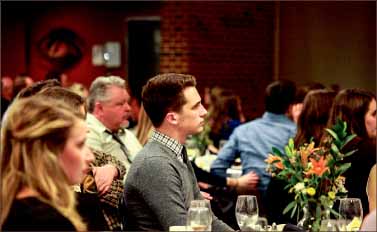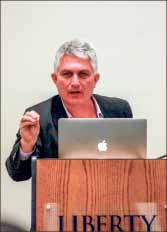Ann Wharton honored

12th annual banquet held for founder of The Champion
“I want to suggest that pop culture is having a deep, on-going discussion about the nature of Jesus, and yet I wonder — do we have eyes to see and ears to hear?” Dr. Craig Detweiler, the guest speaker, proposed the question to an audience of nearly 300 people at the 12th annual Ann Wharton Lecture Series banquet.
Detweiler, a communications professor at Pepperdine University, spoke about “Discovering God in Pop Culture” Thursday, Feb. 18 at the event held in the third floor of Williams Stadium.

Banquet series — Students, faculty and guests heard from Dr. Craig Detweiler as he lectured on “God In Pop Culture” Feb. 18. Photo credit: Jessie Rogers
The banquet, held in honor of Ann Wharton, founder of The Champion newspaper, was hosted by Liberty University’s School of Communication & Creative Arts and co-sponsored by the Center for Apologetics & Cultural Engagement.
Before the lecture, Dean of the School of Communication & Creative Arts Dr. Norman Mintle opened the evening by commenting on the dinner — a surf and turf meal provided by Sodexo — and played two video clips from the movies “Amistad” and “Talladega Nights: The Ballad of Ricky Bobby” to introduce the pop culture topic.
The short scene from “Amistad” included a simple-explanation of the gospel of Jesus Christ by two slaves trapped aboard a slave ship, and the next from “Talladega Nights” showed a prayer to “baby Jesus” from the main character, Ricky Bobby.
While “Amistad” brought about chilling silence across the room, laughter erupted as “Talladega Nights” played on the television screens in the room.
The two, though very different, shared a common subject — Jesus.
Detweiler then transitioned into an explanation of Scripture as special revelation and also how God reveals himself outside of Scripture as general revelation. Detweiler used these two movie clips as examples of general revelation, and he challenged Christians to use media and pop culture references to minister to others.
“If the culture at large says, ‘I can’t see God in Scripture, but I sort of feel God when I see this film or when I listen to this song, can we help connect the … experience (of God in the song or film) to God as revealed in Scripture?” Detweiler said. “And isn’t that our job — to stand in the gap as cultural translators and communicators?”
Detweiler wanted the audience to use movies like “Talladega Nights” and “Amistad” in order to open conversation about who Jesus Christ is. Detweiler also shared a story about the scene from “Amistad” shown earlier that evening.
According to Detweiler, his friend worked for Stephen Spielberg on the set of “Amistad,” and Detweiler questioned his friend about the scene where the gospel was shared between two slaves.
“I was like, ‘Who wrote that? How’d that get in the script?’” Detweiler said. “He said he didn’t know where it came from … because it wasn’t in the script. Folks, that’s more than movie magic.”
Detweiler elaborated more on special revelation throughout biblically based movies like “The Passion of the Christ” and “The Ten Commandments” and general revelation through movies including “Bruce Almighty” or “Nacho Libre” which, while not labeled “Christian,” can lead to conversations about God.
He also encouraged the audience to look for God while spending time outside of devotions or church activities.
“It’s not just finding God at a special time or place like holy week and Easter but throughout our experience,” Detweiler said. “While we’re working, playing or even watching movies … I don’t want that to be time away from God. I want that to be time possibly with God. … If (God) speaks through burning bushes, can he not speak through a film?”
Detweiler offered the idea to engage with pop culture through referencing popular movies, shows and songs and then turning the conversation to the general revelation revealed through the pop culture.
Detweiler also observed Dr. Jerry Falwell Sr.’s past influence in the media and culture.
“Rev. Falwell was like, ‘I’m not gonna abandon the airways, I’m going to invade the airways,’” Detweiler said. “He wasn’t afraid of communicating and going into areas where he wasn’t supposed to go. He didn’t ask for permission.”
Detweiler continued to elaborate on different movies, artists, songs and shows today in which he saw God and shared his personal testimony of how the movie “Raging Bull” brought him to a realization in his life.
After seeing the movie, he compared himself with the main character, who suffered from severe anger issues. He accepted Jesus Christ shortly after seeing the movie and attending a Young Life group, and he explained his reasoning for wanting to change pop culture for the sake of the gospel.
“I want to redeem entertainment in our eyes and sharpen our senses and to focus upon the power of story. … to consider the unexpected places where you might see and hear God like the small screen, the big screen or even your iScreen, ” Detweiler said.
After Detweiler finished, Mintle addressed the audience of artists.
“Great art, great communication, (and) great stories come out of all of us who are filled (with) the spirit of God,” Mintle said.
Finally, Joshua Chatraw, director of the center for apologetics and cultural engagement, made comments at the end of the night addressing the importance of the artists sitting in front of him.
“There’s something about the arts,” Chatraw said. “There’s something about stories that seep into our bones … that … logic and dissertations don’t quite do.”
Tiller is the feature editor.

